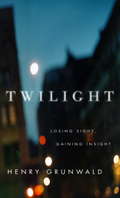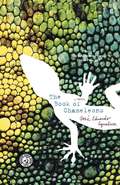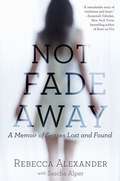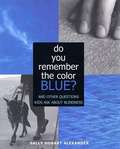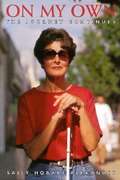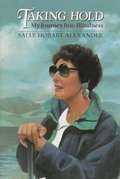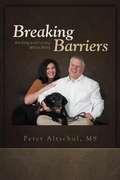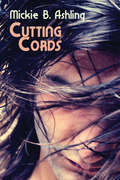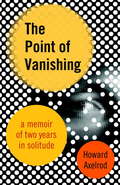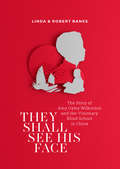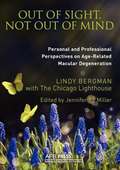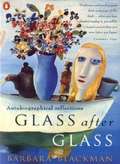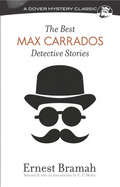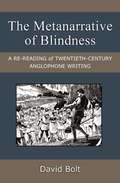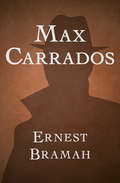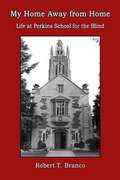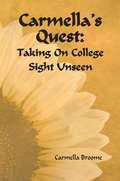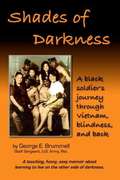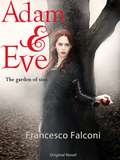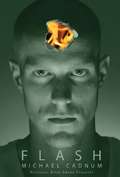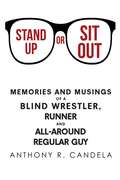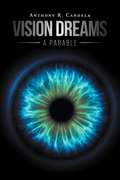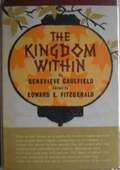Special Collections
Blindness and Visual Impairment Special Collection
Description: A collection featuring biographies, memoirs, fiction and non-fiction by and about members of the blind community. #disability
- Table View
- List View
Twilight
by Henry Grunwald and Mark G. AckermannIn 1992, when Henry Grunwald missed a glass into which he was pouring water, he assumed that he needed new eyeglasses, not that the incident was a harbinger of darker times. But in fact Grunwald was entering the early stages of macular degeneration -- a gradual loss of sight that affects almost 15 million Americans yet remains poorly understood and is, so far, incurable. Now, in Twilight, Grunwald chronicles his experience of disability: the clouding of his sight, and the daily struggle to overcome its physical and psychological implications; the discovery of what medicine can and cannot do to restore sight; his compulsion to understand how the eye works, its evolution, and its symbolic meaning in culture and art. Grunwald gives us an autobiography of the eye -- his visual awakening as a child and young man, and again as an older man who, facing the loss of sight, feels a growing wonder at the most ordinary acts of seeing. This is a story not merely about seeing but about living; not merely about losing sight but about gaining insight. It is a remarkable meditation.
The Book of Chameleons
by Jose Eduardo Agualusa and Daniel HahnFélix Ventura trades in an unusual commodity; he is a dealer in memories, clandestinely selling new pasts to people whose futures are secure and who lack only a good lineage to complete their lives. In this completely original murder mystery, where people are not who they seem and the briefest of connections leads to the forging of entirely new histories, a bookish albino, a beautiful woman, a mysterious foreigner, and a witty talking lizard come together to discover the truth of their lives. Set in Angola, Agualusa's tale darts from tormented past to dream-filled present with a lightness that belies the savage history of a country in which many have something to forget -- and to hide. A brilliant American debut by one of the most lauded writers in the Portuguese-speaking world, this is a beautifully written and always surprising tale of race, truth, and the transformative power of creativity.
Not Fade Away
by Rebecca Alexander and Sascha AlperEven a darkening world can be brilliantly lit from within.
Born with a rare genetic mutation called Usher Syndrome type III, Rebecca Alexander has been simultaneously losing both her sight and hearing since she was a child, and was told that she would likely be completely blind and deaf by age 30. Then, at 18, a fall from a window left her athletic body completely shattered.
None of us know what we would do in the face of such devastation. What Rebecca did was rise to every challenge she faced. She was losing her vision and hearing and her body was broken, but she refused to lose her drive, her zest for life and - maybe most importantly - her sense of humor. Now, at 35, with only a sliver of sight and significantly deteriorated hearing, she is a psychotherapist with two masters' degrees from Columbia University, and an athlete who teaches spin classes and regularly competes in extreme endurance races. She greets every day as if it were a gift, with boundless energy, innate curiosity, and a strength of spirit that have led her to places we can't imagine.
In Not Fade Away, Rebecca tells her extraordinary story, by turns harrowing, funny and inspiring. She meditates on what she's lost--from the sound of a whisper to seeing a sky full of stars, and what she's found in return--an exquisite sense of intimacy with those she is closest to, a love of silence, a profound gratitude for everything she still has, and a joy in simple pleasures that most of us forget to notice.
Not Fade Away is both a memoir of the senses and a unique look at the obstacles we all face--physical, psychological, and philosophical--exploring the extraordinary powers of memory, love, and perseverance. It is a gripping story, an offering of hope and motivation, and an exquisite reminder to live each day to its fullest.
Do You Remember the Color Blue?
by Sally Hobart AlexanderChildren ask questions of an author who lost her vision at the age of twenty-six, including "How did you become blind?" "How can you read?" and "Was it hard to be a parent when you couldn't see your kids?"
On My Own
by Sally Hobart AlexanderThe second part of the author's autobiography, of which the first part, Taking Hold, was published in 1994. The author describes the difficulties and accomplishments she experiences as she adjusts to living independently after losing her sight.
Taking Hold
by Sally Hobart AlexanderA true story of the author's loss of vision as a young woman and of her adaptation to blindness.
Breaking Barriers
by Peter AltschulFor some unknown reason, Peter Altschul was born totally blind. He grew up in a working-class town where, with the help of his persistent mother, he broke through barrier after barrier, determined to live a full life.
After attending a private school that initially turned him away--simply because he was blind--Peter details how he discovered his gift for music, eventually playing percussion in the orchestra, marching band, and jazz ensemble at Princeton University.
But it was only after Peter graduated from college that it became evident he would need a guide dog. Heidi, a Weimaraner with a large repertoire of barks, howls, and grunts, would assist Peter for the next eight years through the halls of New England Conservatory, where he eventually obtained a master's degree in music composition.
Peter relays how he blazed a unique professional trail while simultaneously overcoming obstacles; managed his uneasy relationship with music; and embraced his unexpected entrance into an unfamiliar and romantic world.
He also provides an unforgettable glimpse into the wonderful ways his five guide dogs supported him on his journey from urban bachelorhood to the light of love.
Breaking Barriers shares a compelling account of one man's journey through life as he and each of his specially trained dogs learned to trust each other, ultimately melding into a smooth working team that tackled the world-together.
White Coat, White Cane
by David Hartman and Bernard AsbellThe woman's arthritic fingers feel gnarled and crooked, her knees lumpy rocks. But I can detect no swelling, so I press here, there, trying to rouse an inflamed spot. "What are you doing"she challenges. "You're blind!"
"I'm examining you. Haven't you ever been examined by a blind doctor before?"
She refuses to be humored. "That's silly. What can a blind doctor do?"
"I'm not sure, but we're going to find out..."
When David Hartman, blind since the age of eight, announced his intention to become a doctor, the reactions ranged from sympathy to ridicule. How could he diagnose his patients? Examine them, except by touch? Look through a microscope? Even understand what was being described?
The battle lines were drawn: David and his family on one side, the schools and society on the other. But with an incredible strength of purpose, David Hartman went on to become the first blind person in over 100 years to enter medical school. What is it like to adjust to a world of darkness? David Hartman lets us know bluntly, with real emotion, insight, and humor. He had to relearn the simplest things. He had to overcome mental obstacles that were at times more formidable than the physical ones. Yet he was determined to reach beyond his difficulties to fulfill an impossible dream.
His teachers were helpful, hostile, embarrassed, unsure-and in medical school he had to work twice as hard. The work had to be read to him or translated into Braille. Often he had to rely on a sighted person to confirm his diagnosis, and he needed a nurse to read the patients' charts to him. But he utilized all his other senses to achieve his greatest desire: helping to heal. His journey is a moving and inspirational story for us all.
Cutting Cords
by Mickie B. AshlingWhen Sloan Driscoll and Cole Fujiwara become reluctant roommates, neither man is willing to share too much. Sloan is instantly attracted to Cole but knows it's a hopeless cause; Cole has a steady girlfriend. But one night they share a joint, and Cole opens a window neither anticipated.
A relationship may be impossible--both men are living with heart-breaking secrets. While Sloan is smart, sassy, and a brilliant graphic artist, he's also a pothead with severe body image problems. Cole, a former major league pitcher, has his own personal crisis: he's going blind. Sloan and Cole are suffering on so many levels, they might not realize that the ultimate salvation could be within each other's arms.
The Point of Vanishing
by Howard AxelrodInto the Wild meets Portrait of the Artist as a Young Man--a lyrical memoir of a life changed in an instant and of the perilous beauty of searching for identity in solitude On a clear May afternoon at the end of his junior year at Harvard, Howard Axelrod played a pick-up game of basketball. In a skirmish for a loose ball, a boy's finger hooked behind Axelrod's eyeball and left him permanently blinded in his right eye. A week later, he returned to the same dorm room, but to a different world. A world where nothing looked solid, where the distance between how people saw him and how he saw had widened into a gulf. Desperate for a sense of orientation he could trust, he retreated to a jerry-rigged house in the Vermont woods, where he lived without a computer or television, and largely without human contact, for two years. He needed to find, away from society's pressures and rush, a sense of meaning that couldn't be changed in an instant.From the Trade Paperback edition.ions of perception, time, identity, and meaning.From the Trade Paperback edition.
They Shall See His Face
by Robert Banks and Linda BanksAmy Oxley Wilkinson was arguably the most widely known female Australian missionary in China and the West in the early 20th century. She was the great granddaughter of colonial chaplain Samuel Marsden and granddaughter of celebrated explorer John Oxley. After rescuing an abandoned blind boy, she founded an innovative Blind Boys School in Fuzhou which is now a major institution in Fujian Province. Her husband Dr George Wilkinson set up the city’s first hospital and introduced a program to address the pervasive curse of opium addiction.
Amy’s holistic and vocational approach to disability education brought her national and later international recognition. In 1920, the president of the new Chinese republic awarded her the Order of the Golden Grain, the highest honour a foreigner could receive. Two years later, Amy and the School’s brass band were presented to Queen Mary in England.
Amy’s story highlights the significance of Australia’s contribution to the development of early modern China and is a challenge to anyone committed to making their life count for others.
Out of Sight, Not Out of Mind
by Lindy BergmanOut of Sight, Not Out of Mind presents a personal account of living successfully with age-related macular degeneration (AMD), combined with powerful new information on effective service delivery. Ninety-three-year old Lindy Bergman illustrates the ways in which life with low vision can be lived with independence, dignity, and personal satisfaction. Also included are highly informative chapters, written by the world-renowned experts from The Chicago Lighthouse for People Who are Blind or Visually Impaired, encompassing the latest information about the causes and treatment of AMD; a concise, informative overviews of the effects of aging on vision, the emotional and psychological components of vision loss and the integration of the individual's psychological recovery into low vision service delivery; and a cutting-edge model of rehabilitation that meets the challenges of service provision today. Foreword by Jonathan Safran Foer, award-winning author of Everything Is Illuminated and Extremely Loud and Incredibly Close.
Glass After Glass
by Barbara Blackman'One life has many autobiographies. It depends how one sinks one's shaft of remembering. . . ' Barbara Blackman's gift for the feel and weight and place of words, the music of words, draws us into her life as daughter, lover, friend, wife, mother, grandmother. She writes of the wonderful ordinariness of 'household things, children above all, dirty, earthy and high-to-Heaven things. Her portraits of family and friends, many to become among Australia's finest artists, reveal both a delightful sense of the absurd and a great capacity to love. Blind since her early twenties, Blackman writes about the bohemian circles of Australia and London, where she and her artist husband were leading figures.
The Best Max Carrados Detective Stories
by Ernest Bramah and E. F. BleilerSightless detective Max Carrados solved his first cases in Edwardian London, in the early days of the 20th century when the city was the beating heart of the vast British Empire. This collection contains the very best tales of the blind sleuth, 10 adventures that range from his first challenge, "The Coin of Dionysus," to mysteries set during the World War I era and the early 1920s. Like Sherlock Holmes, Max Carrados debuted in The Strand magazine, and his stories rivaled those of the Baker Street detective in popularity. Since then, compilation volumes of the frequently anthologized tales have long been out of print and hard to find. This collection offers an excellent introduction to the suave private investigator whose deductive skills are surpassed only by his perceptive powers, which enable him to hear a heartbeat from across the room. Carrados' creator, Ernest Bramah, was one of the few authors in the early days of detective fiction who could combine physical and intellectual thrills with imagination and stylistic brilliance. Brimming with charm and humor, these vintage stories are utterly unique in the field of detective literature.
The Metanarrative Of Blindness
by David BoltAlthough the theme of blindness occurs frequently in literature, literary criticism has rarely engaged the experiential knowledge of people with visual impairments. The Metanarrative of Blindness counters this trend by bringing to readings of twentieth-century works in English a perspective appreciative of impairment and disability. Author David Bolt examines representations of blindness in more than forty literary works, including writing by Kipling, Joyce, Synge, Orwell, H. G. Wells, Susan Sontag, and Stephen King, shedding light on the deficiencies of these representations and sometimes revealing an uncomfortable resonance with the Anglo-American science of eugenics.
What connects these seemingly disparate works is what Bolt calls “the metanarrative of blindness,” a narrative steeped in mythology and with deep roots in Western culture. Bolt examines literary representations of blindness using the analytical tools of disability studies in both the humanities and social sciences. His readings are also broadly appreciative of personal, social, and cultural aspects of disability, with the aim of bringing literary scholars to the growing discipline of disability studies, and vice versa. This interdisciplinary monograph is relevant to people working in literary studies, disability studies, psychology, sociology, applied linguistics, life writing, and cultural studies, as well as those with a general interest in education and representations of blindness.
Max Carrados
by Ernest BramahLegendary blind detective Max Carrados doesn't need his eyesight to see the crook in a tough case Max Carrados is the greatest detective you've never heard of. He may be blind, but what Carrados lacks in sight he more than makes up for in perception. He can pick out a voice in a crowded room and read a book by running his fingers over the print. Those who underestimate his abilities are soon surprised by the keen Carrados. In one story, Carrados tracks down a criminal by analyzing a coin without ever leaving his study. Another finds him solving the mystery of a train accident that has far more to it than anyone expected. Bramah's stories of Carrados regularly appeared in the Strand magazine, receiving top billing even over those of Doyle's Sherlock Holmes. This ebook has been professionally proofread to ensure accuracy and readability on all devices.
My Home Away from Home
by Robert T. BrancoFrom the ages of 12 to 19, the author attended a school for the blind. He tells about life in the "cottages," academics, sports, field trips, vocational training, and more. He had good and bad teachers, followed wise rules and absurd ones, met good friends and bullies, and welcomed administrative changes. Perkins educated him very well; this book will surely educate and entertain many others.
Carmella's Quest
by Carmella BroomeThe author, who is blind, describes her years at North Greenville College.
Shades of Darkness
by George E. BrummellThe last image I ever saw--the instant before my eyes were seared by a landmine explosion in the jungles of Vietnam--is always with me. Many times during the past forty years, I have thought of myself as unlucky. But a soldier I met recently left me wondering. The meeting happened on a visit with a friend and fellow Vietnam veteran to Walter Reed Army Hospital in Washington, D.C., where some of America's wounded warriors from Iraq and Afghanistan were being treated.
Adam & Eve - The Garden of Sins
by Francesco Falconi and Georgiana BulanceaTwo different worlds, two lonely souls that are going to meet. Sofia is the last descendant of the Spanish family of Alvarez. For years she has lived segregated in a villa in Florence. Rarely does she leave the house, she spies the world from the window of her room. She dreams it, wishes it, and yet she hates it. But mostly she hates The Left Sofia. So does she call that part of her face which was disfigured because of a fire in the garden of the villa when she was just a child. A silly game with her brother Alejandro, a small fire burning near a dry scrub. Terrible consequences that forever changed her future. Because in that garden Sofia has not only lost the perfection of her beauty, but also her brother Alejandro. Lorenzo lives on the outskirts of Florence with his father. At the age of eight he contracted a terrible degenerative disease that, day after day, made him blind. Since then, the world of Lorenzo became a chiaroscuro of light and shadow that vibrate to the music. Music, in fact, is his only reason for living. The cello is his only voice. One day, Lorenzo and Sofia meet in the Boboli Gardens, just in front of the statues of Adam and Eve. They get to know each other, they befriend. Day after day, their relationship turns into something deeper and more complicated. A perfect and inviolable feeling. A blind and sincere love. But the world around them, the desire to see beyond the shadows and enjoy the beauty is too great temptation that can disrupt even that Eden of love ...
Flash
by Michael CadnumWhen two teenage brothers bungle a bank robbery, their attempt to hide the evidence is witnessed—aurally—by Terrence, a legally blind neighbor. Terrence tells his girlfriend, Nina, and her brother, who then disappears with a handgun. Nina is afraid of what he might do to the brothers. But she also has every reason to fear what the brothers will do to Terrence. Flash ingeniously interweaves the stories of two who are hellbent on a destructive path, two who stand in their way, and one whose actions may be the spark to set the whole thing off.
Stand Up or Sit Out
by Anthony CandelaIn this memoir, Anthony Candela, a self-described "all-around regular guy," traverses a lifetime of challenges. Some of these are accidents of birth, like his poor eyesight and slow trek to blindness, and some are of his own making, like choosing to compete as a scholar-athlete. Infused with lots of New Yorkana, a touch of California, and a few related historical references, this memoir conveys that in any environment, life does not always follow a prescribed course. Moreover, as humans, all of us are imperfect. This includes people with disabilities who are often thought of as transcendent beings, but who should also be regarded as "all-around regular guys." Just like the rest of the human race, they often strive imperfectly to get through life.
In his descriptions, the author hopes that readers will understand a little more about the nuts and bolts of running and wrestling, not to mention skiing and scuba diving. The ups and downs of coping with life and progressive loss of eyesight and, by extraction, disability in general will be clearer. Readers will come away with a fuller appreciation of the ways people deal with challenges. In the end, we all have a choice whether to stand up or sit out.
The story related in these pages will occasionally give you cause to chuckle or even shed tears of sadness or joy. Above all else, it will enlighten you about why things happen the way they do. Ultimately, this memoir increases our understanding of what it means to be truly human. Perhaps after reading it, we will be kinder and gentler to each other. Most important, perhaps we will take it a little easier on ourselves.
Vision Dreams
by Anthony CandelaIn this dystopian novella, Anthony Candela, a self-described “Trekker” and “secular humanist”, shows us the extremes to which societies will go if sufficiently frightened, especially if science and technology permit it. Individuals will do likewise in order to achieve, if not happiness, then at least relief from tyranny. In this story, the narrator, who both hovers above the action and is totally immersed in it, tells of the lengths he and his three co-adventurers go to achieve their goals. One wants an even chance at life and, oh yes, to be a star baseball player; another wants to fly. A third seeks true artistic sensuality, and the fourth wants nothing more than the Freudian essentials of success at love and work. Unfortunately the society they live in has hunkered down, devoting nearly all of its resources to self-protection and very little to everyday human comforts—all except for a small group of scientists who appear to be bucking the system.
Ultimately by extraction, this novella increases our understanding of what it means to live in a society that is supportive of its citizens’ daily happiness and humanity. Perhaps after reading it, you will be more on guard against what can happen when nations decide to be hypervigilant. As the plot unfolds, you will see the lengths to which people will go to achieve their humanity. In the midst of the subtle kinds of strife that leads many to live lives of quiet desperation, there are heroes willing to take risks.
The Kingdom Within
by Genevieve CaulfieldGenevieve Caulfield became blind as an infant, and was educated at the Perkins and Overbrook Schools for the Blind before attending college. When she was seventeen she became passionately interested in Japan, and determined to work there as a teacher. This memoir describes her long and careful preparations for her move to Japan, and her 14 years there as a teacher of English. In 1937, as Japan went to war in Manchuria and its relations with the United States deteriorated, Caulfield relocated to Thailand, where she established that nation's first school for blind children. Along the way Caulfield made innumerable friends, adopted a Japanese daughter, and raised her twin grandchildren after her daughter's tragic death. Life in Thailand during World War II is vividly portrayed in this memoir. This is a straightforward account by a woman of enormous determination and ability.
My Eyes Have A Cold Nose
by Hector ChevignyThe author says that when he became blind, he thought it would be a great nuissance, and indeed it was. He maintains that the greatest problem for blind people is society's fixed notions that blind people are utterly helpless and utterly tragic, and he describes how he and other blind people have dealt with this problem. One of the key parts of his rehabilitation was his training at The Seeing Eye. This book is old, but still relevant in many ways.
